The Syrian debacle
With 83 states and intergovernmental organizations represented, the second “Friends” of Syria conference was a media success. Yet, all the glimmer and gloss cannot hide NATO’s and the GCC’s defeat in Syria, which after a year of low intensity war have failed to bring about regime change and are now compelled to retreat in the face of the Russian-Sino-Iranian front. Thierry Meyssan sheds light on this bizarre diplomatic conference where words were not used to declare but to obscure.
by Thierry Meyssan
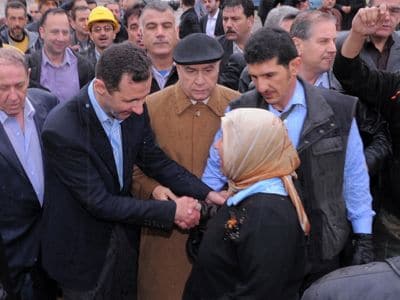
On 27 March 2012, President Bashar al-Assad traveled to Homs where he visited the district of Baba Amr, the location where Syrian Takfirists [1] and foreign fighters had set up for one month an independent Islamic Emirate. He promised the displaced residents that the State would rebuild their homes “much better than before,” and they could soon return home. Thousands of people, mostly Sunni, had been forced to escape to avoid falling under the Islamists’ dictatorship. In their absence, the houses were pillaged and hundreds of them were blown up by rebels, when not already destroyed during the fighting.
Bashar al-Assad, who continues to be the most popular head of state in the Arab world, met with Homs dwellers, but refrained from the traditional walkabout due to the likely presence of isolated terrorists.
“The battle to topple the Syrian regime is over once and forever,” said Jihad Makdissi, the Syrian Foreign Ministry spokesman. The country, whose main energy infrastructure and telecommunications have been sabotaged, is entering a phase of reconstruction.
In the meantime, NATO and the GCC have continued to indulge in their schemes. A meeting of the Syrian National Council was held to adopt a “National Pact,” acceptable to Western public opinion. The intent was to give a secular and democratic varnish to an entity dominated by the Muslim Brotherhood, which calls for the establishment of Sharia law and an Islamic regime. The platform, framed by the Brothers, was subsequently groomed by communications consultants and embellished with a few politically correct expressions. It was adopted following a doubtful election procedure in which the Brothers voted against it, but had arranged for the participation of outsiders who voted in favor, so that the text was passed without their having to disavow it. The bottom line is that the Council now has a programmatic text which commits only those who read it, and that most of its permanent members hope to do away with at the earliest opportunity.
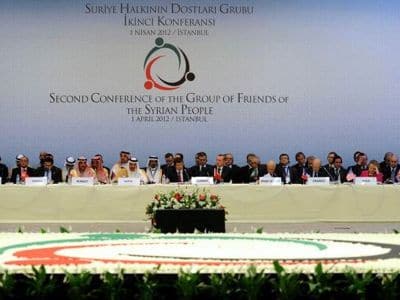 For their part, the Arab League Secretary General and his UN counterpart appointed Kofi Annan as joint special envoy to negotiate a crisis exit.
For their part, the Arab League Secretary General and his UN counterpart appointed Kofi Annan as joint special envoy to negotiate a crisis exit.
He put forward a six-point plan, which is a slightly amended version of the Russian proposal to the League. He obtained the agreement of President al-Assad on condition that the plan’s provisions are not subverted and used to infiltrate new weapons and fighters.
It is in this context that NATO and the GCC convened the second “Friends” of Syria conference, on Sunday, first of April, in Istanbul. It was chaired by Turkey and attended by 83 States and intergovernmental organizations [2].
In line with their previous meeting in Tunis, 24 February, participants primarily reaffirmed their support for a “Syrian-led political transition leading to a civil, democratic, pluralistic, independent and free state; one which respects people’s rights regardless of ethnicity, belief or gender;” a ludicrous position coming from, inter alia, states that are neither civil nor democratic nor pluralistic, and even less free or independent and which discriminate against their citizens according to their ethnicity, religion or gender, such as Saudi Arabia and Qatar.
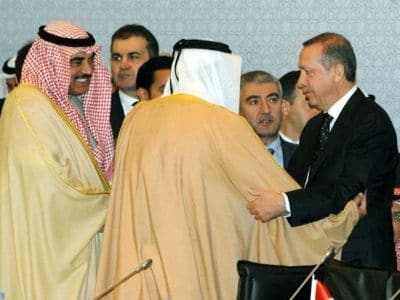 Then, the “Friends” of Syria expressed their unwavering support for the six-point plan of Kofi Annan, at the same time as the Turkish chair was proposing to arm and fund the rebels, in breach of the Annan plan.
Then, the “Friends” of Syria expressed their unwavering support for the six-point plan of Kofi Annan, at the same time as the Turkish chair was proposing to arm and fund the rebels, in breach of the Annan plan.
In the same vein, the Conference heard reports by the Syrian National Council. It welcomed the formal adoption of the National Pact, and the willingness of Council members to work together, forgetting that the last Council meeting ended with shouting, door slamming, and the resignation of 24 Kurdish delegates. Accordingly, it recognized the Council as “a” legitimate representative of the whole Syrian people, and as an umbrella organization for Syrian opposition groups.
These undeserved praises should not be understood as reflecting ignorance of the situation or blindness, but as a diplomatic sugar coating helping to swallow a big disappointment. In fact, the Conference refused to recognize the Council as “the” representative of the Syrian people, that is to say, as a parliament in exile, which could appoint a government in exile and claim the Syrian seat at the United Nations. This rebuff shows that the “Friends” of Syria have abandoned regime change and that the Council is no longer destined to rule. Its function is now limited to participating in media campaigns against its country. In this context, it will be necessary for the White House propaganda department to control the communications of all Syrian opposition groups. Hence, the Conference insisted on having only one focal point, the Council, into which all opposition groups were ordered to melt.
Syria Accountability Clearinghouse
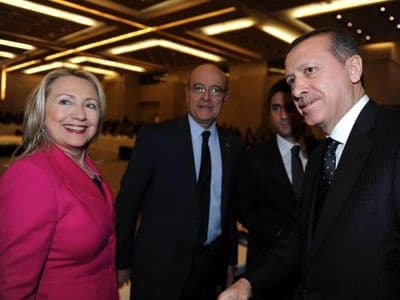 With this disciplinary matter out of the way, the Conference proceeded to officially record the creation of three new organs.
With this disciplinary matter out of the way, the Conference proceeded to officially record the creation of three new organs.
First, at the initiative of the U.S. State Department, a clearinghouse was set up to “collect, collate, analyze” all available information on violations of human rights committed by the Syrian authorities in view of their future judgment by an international court [3].
Those of us in Damascus can recall that for years the U.S. thought they could pin on President Bashar Assad the responsibility for the assassination of former Lebanese Prime Minister Rafik Hariri. They worked on the collection of false witness accounts and the establishment of the Special Tribunal for Lebanon.
We listened to Washington’s vassals in the Middle East prophesy that the Syrian president would be dragged to The Hague bound hand and foot. We also remember that the false testimonies compiled against Assad crumbled amid corruption scandals and that Washington decided to aim its pseudo-legal device against other targets.
The fact remains that this structure will be primarily responsible for coordinating the work of NGOs already directly or indirectly subsidized by Washington, such as Amnesty International, Human Rights Watch and the International Federation of Human Rights. To cover secretarial expenditures, the State Department immediately outlaid $ 1.25 million and provided carefully selected staff.
Sanctions Working Group
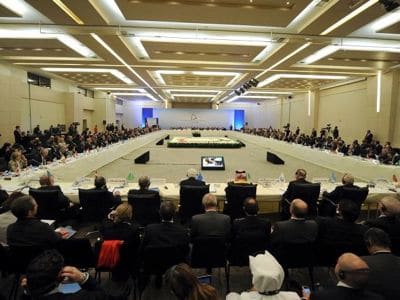 The Istanbul Conference created a Sanctions Working Group, officially to coordinate and optimize the measures taken by the United States, European Union, Arab League, etc. The Syrians had responded by emphasizing that while the sanctions would hurt them, they would kill some of their neighbors. Hence the recommendation in the final document that the Group should make sure that such sanctions do not impair third countries, which may involve the opening of alternative trade routes.
The Istanbul Conference created a Sanctions Working Group, officially to coordinate and optimize the measures taken by the United States, European Union, Arab League, etc. The Syrians had responded by emphasizing that while the sanctions would hurt them, they would kill some of their neighbors. Hence the recommendation in the final document that the Group should make sure that such sanctions do not impair third countries, which may involve the opening of alternative trade routes.
The Arab League had, in fact, been forced to suspend its sanctions against Syria because they directly threatened the economy of its own members. For example, Jordan found itself brutally deprived of more than two thirds of its imports, which also meant cutting itself off from the drinking water supplied by Syria. In one week, its economy had collapsed.
The Sanctions Working Group has apparently been tasked with squaring the circle. Its first meeting was held in Paris in the second half of April, that is to say, before the French presidential election and the expected policy change that will ensue.
The Working Group on Economic Recovery and Development
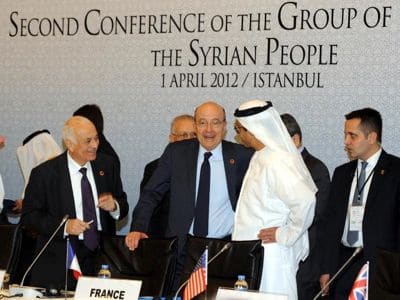 The third and final organ established by the Conference is the Working Group on Economic Recovery and Development. It had originally been planned that the Syrian National Council would form the first government after the overthrow of Syrian President Bashar el-Assad. Accordingly, it was to receive substantial financial assistance, enabling it to rally the population enfeebled by the sanctions. The promise of this manna lured all possible sharks into the Council.
The third and final organ established by the Conference is the Working Group on Economic Recovery and Development. It had originally been planned that the Syrian National Council would form the first government after the overthrow of Syrian President Bashar el-Assad. Accordingly, it was to receive substantial financial assistance, enabling it to rally the population enfeebled by the sanctions. The promise of this manna lured all possible sharks into the Council.
To the extent, on the one hand, that the regime change option has fallen by the wayside and, on the other hand, that a tightening of sanctions is on the cards, what sense does it make to help President al-Assad revive the economy and develop his country? And why is this working group co-chaired by the UAE and Germany?
Our hypothesis, until further notice, is that this working group is in charge of cloaking the payment of war reparations by France in exchange for the return of her officers detained in Syria. Our readers and listeners know that 19 French soldiers were arrested in Syria and that three of them were handed over to the Chief of Defence Forces, Admiral Edouard Guillaud, during his visit to Lebanon. Negotiations are continuing between the two parties to the conflict by the agency of the UAE. France has acknowledged that the prisoners are French nationals, even if they all have dual Algerian or Moroccan nationality, but she denies that they were on a military assignment. France maintains that they are jihadists, who came to fight on their own initiative and without her knowledge. On the other hand, Syria argues that the NATO communication equipment in their possession proves they were operating under this flag. Whatever the case may be, France could pay compensation for their release, but the amount thereof is difficult to establish. Syria is claiming for war damages for the thousands of people killed and the infrastructure destroyed. France points out that if there actually was a secret war, she could not have conducted it alone and could therefore not be expected to bear sole responsibility. In the event that France would agree to pay the money, she would still refuse to publicly acknowledge the reason for transferring the funds. She would thus need to blur the money trail with the help of her German partner.
What strategy for NATO and the GCC?
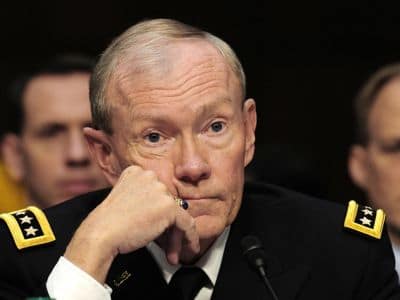
The outcome of this conference discloses the new U.S. strategy, and consequently that of NATO and the GCC.
Washington has stopped pursuing regime change in Syria because it lacks the military means.
Initially, rather than recognizing it, Defense Secretary Leon Panetta had rationalized that a military intervention would only complicate the situation on the ground and throw the country into civil war instead of preventing it.
Then, General Martin Dempsey, Chairman of the Joint Chiefs of Staff, and General James Mattis, commander of United States Central Command, finally admitted that the U.S. Air Force was not in a position to bomb Syria, if ordered to, considering that the country is now equipped with Russia’s most effective anti-aircraft system in the world.
Moreover, the U.S. generals also admitted that Syria’s air and space is still being monitored; however, not for the purpose of feeding information to the Free “Syrian” Army, but to prevent the chemical and biological arsenals from falling into its hands. In other words, not only has Washington abandoned the idea of bringing about regime change by force, but it is taking steps to avert it so as to steer clear of a conflict with Russia, China and Iran.
In the absence of a better solution, Washington has decided to exploit the Syrian case in order to embarrass Moscow and Beijing. The establishment of the Syria Accountability Clearinghouse boils down to the launching of a new anti-Syrian propaganda campaign, not to pave the way for a NATO intervention, but to accuse Russia and China of being dictatorships supportive of another dictatorship. And sanctions no longer aim to dishearten the bourgeoisie in an effort to turn it against the regime, but to make Russia and China pay for Syria.
It is against this background that one must interpret Alain Juppe’s state of agitation. The French Foreign Minister is aware that his anti-Syrian statements are vacuous, but he couldn’t care less since he will soon be leaving office, and his successor will refuse to put up with the consequences in the name of political alternation. His escalating rhetoric serves both to nourish the file that has been entrusted to the Syria Accountability Clearinghouse, and to satisfy a lobby whose support he will find useful once in the opposition.
In this regard, Damascus, which anticipates the electoral defeat of Nicolas Sarkozy, has sent a high-level diplomat to Paris. He met his friend, a former Socialist foreign minister, who introduced him to François Hollande, Nikolas Sarkozy’s electoral rival. Syria is aware of the Socialist candidate’s ties with Israel and Qatar. But she is confident that the next French president will fundamentally embrace the U.S. position, and consequently cease all support to the armed opposition.
Source: Voltairenet.org
Editing: Debbie Menon
French intellectual, founder and chairman of Voltaire Network and the Axis for Peace Conference. His columns specializing in international relations feature in daily newspapers and weekly magazines in Arabic, Spanish and Russian. His last two books published in English : 9/11 the Big Lie and Pentagate.
ATTENTION READERS
We See The World From All Sides and Want YOU To Be Fully InformedIn fact, intentional disinformation is a disgraceful scourge in media today. So to assuage any possible errant incorrect information posted herein, we strongly encourage you to seek corroboration from other non-VT sources before forming an educated opinion.
About VT - Policies & Disclosures - Comment Policy




